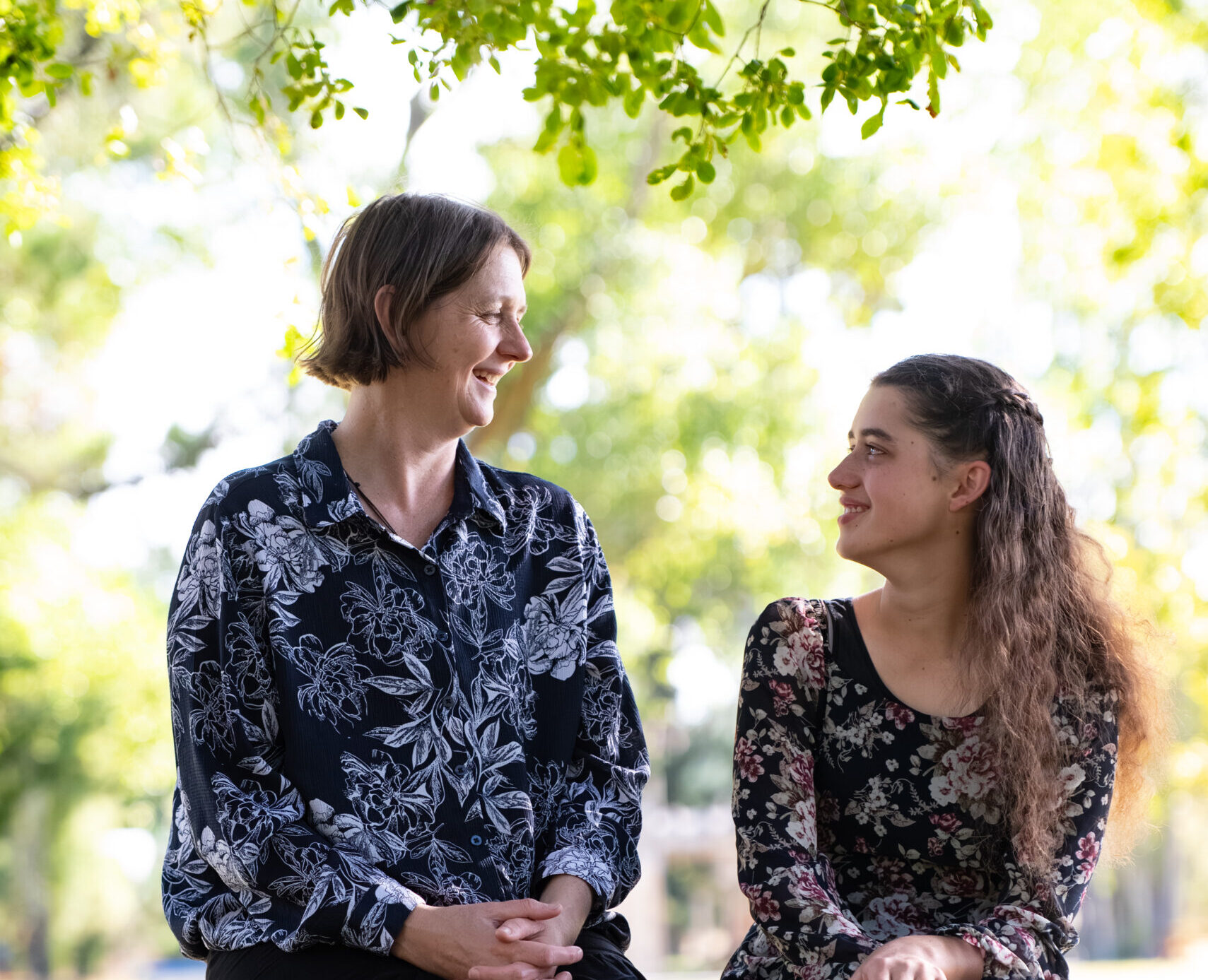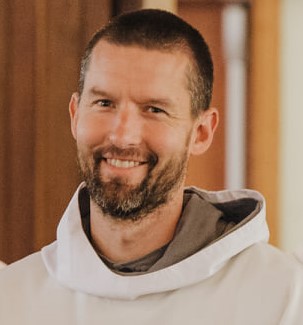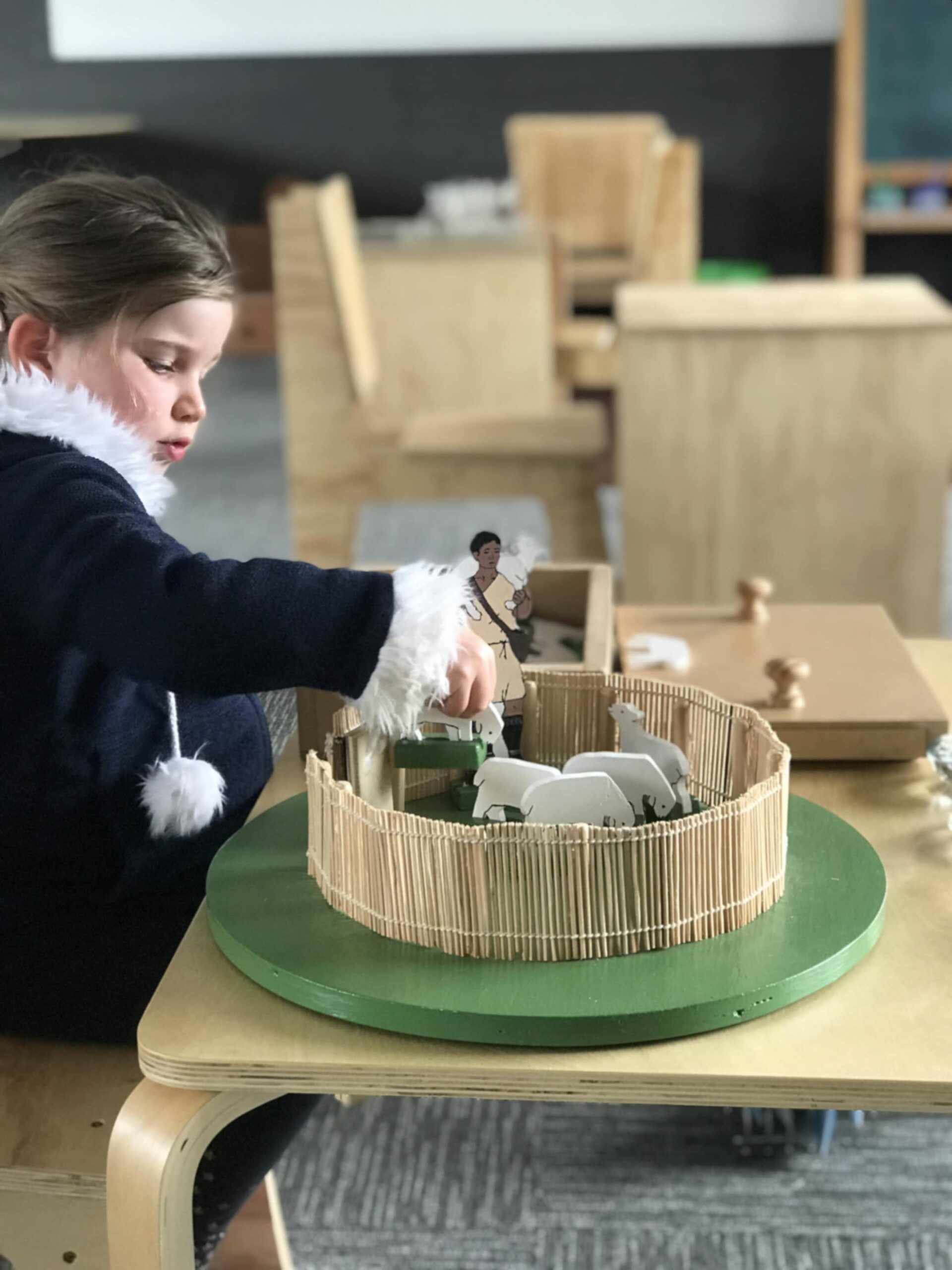Deborah has been homeschooling for fifteen years, and has used resources from a classical curriculum from the start. She said, “I was attracted to the idea of teaching children according to their developmental stages.” She liked the idea of teaching children orally first, when they are younger and good at memorization, and then building their grammar and logic towards being able to “put forward an argument beautifully and persuasively.”
With the younger children, she reads to stories to teach sequencing, and then, when they get older, “they’re getting those reasoning faculties and they want to try and..argue about something, so it’s good to give them a topic to argue about, rather than, you know, the chores.” Her younger ones memorize poetry. She mentions A Child’s Garden of Verses, Mother of Divine Grace resources, learning about art, artists, music, and composers, facts about geography and maths, and Latin and Greek flashcards. For developing argument skills when they’re older, she talks about debates, and writing papers on their opinion, as well as discussions in their MODG online classes.
Deborah talks about her decision to use MODG. The Maramboses were living in England when she started homeschooling, and MODG was the curriculum that many other homeschoolers used. When they moved to New Zealand, Deborah tried other resources, but returned to MODG. She says, “I could get a lot of support from them, the curriculum was quite well established, and, for a large family, it’s quite affordable, they really cater to large families as well, so we appreciated that.”
In MODG, Deborah enrolls the family, and a consultant helps plan school year for each child. Debora says “although they have set curriculum, there’s quite a lot of flexibility, and you can also use your own curriculum…I enjoyed having that support from the consultant, and my consultant’s just been fantastic. At any point I can email her and say ‘I’m struggling with this,’ ‘I don’t understand that’ or ‘this child’s finding this curriculum difficult’ and she’s happy to accommodate that or give me some advice.” Each child received a student page with a printable list, allowing the older ones to be more independent. Having the curriculum gives Deborah time to do other things like cooking, cleaning, and “managing the home.”
Deborah says, “The way its [MODG] helped me is it’s a very strong Catholic curriculum, and for me that was the most important thing. Not having a strong Catholic education myself, I wanted someone to support me in teaching the kids and I didn’t want to be missing out on important facts…so that’s what we wanted above all.”
MODG is Northern-hemisphere based, which can be a challenge. However, the kids actually enjoyed learning American history, such as reading Laura Ingalls Wilder. The math is not specific to any hemisphere. Geography can be a bit different. You can still do New Zealand history though. Sometimes school holidays are a little different, and Deborah says the “classes sometimes are very early in the morning, but my kids have really liked getting up early, some of them have really enjoyed having an excuse to get up at five o’clock in the morning, to be in classes. But then again, those are optional..I found them very accommodating.”
Deborah compared classical homeschooling to her own education in a school. Sometimes at school, kids are expected to write quite early. Deborah says, “I really struggled with writing at school and we didn’t do a lot of writing. I don’t think it was taught very well at my school.” in classical education, “the kids really learn to think about things, that’s one thing I’ve appreciated…you can slow down the amount of information that you’re giving them, and rather, do less, but think more deeply about the information. When [I] did school a lot of it was exam-focused…I like to think that the kids, our kids, have had more of an opportunity to explore different subjects, and to think about what they’re learning, rather than just trying to pass the exams.”
Deborah talks about learning the Faith through classical homeschooling; “you’re making sure that the kids learn their Catechism questions. You’re exposing them to beautiful music and art from the word ‘go.’ From a very young age, kids can learn hymns from Church, hymns that are quite rich Theologically. They don’t have to just learn kids’ Bible songs, they can learn some very beautiful Catholic hymns, they can even learn them in Latin, and I think you can expose them more to the beauty and the depths of the teaching of the Church. Even from a young age where they might not understand it fully, they’re starting to put these things into their mind, and that will stay there so that when the children grow up, they have beautiful thoughts and music and art in their mind to help their Faith, and for them to reflect and meditate on. I think also learning logic, you know, logic helps us with philosophy and theology, and it’s important to have those skills, that we can think correctly about God.”
About the kids finishing school and moving on, Deborah says, “when [the kids] finish school…they will at least know how to write an essay, so when they get to university they don’t have to learn that skill. They’ve got that all down, they’ve got the grammar, they’ve got the paragraphs, they’ve got the mechanics of collecting information, thinking about it, ordering it, so they can really focus on the information at university, on putting forward an argument in a beautiful way, whereas when I went to university I still had to figure that all out ‘cause I didn’t learn it at school. Getting into university hasn’t been a problem. Our kids get a high-school diploma when they’re finished, which is an American qualification, and on top of that we let them to an SAT.” An SAT is once-off test they can do in Christchurch. “Mother of Divine Grace has been a very good preparation for the SATs.” Deborah’s kids did very little specific SAT prep but still did well on the exam. Deborah says, “I think that’s cause the curriculum that they did sort of really just prepared them well for the SAT, and that was very useful to get into universities, a lot of universities know about the SAT. They use that for international students, so it’s quite well-recognized around the world.”
For families who want to educate classically, there are also a lot of online resources. Deborah says “It’s not so much what you use, it’s the way you teach that subject…you want to use good poems…but it’s not so much which poems you’re using, it’s more the fact that you’re using the poems, and that they’re memorizing them. She recommends Designing your own Classical Curriculum by Laura Berquist.
Asked to pick a favorite thing about classical homeschooling, Deborah hesitated. Then she said, “I’ve always just liked reading real books to kids.” Reading good, classical literature is so much more enjoyable than textbooks!





